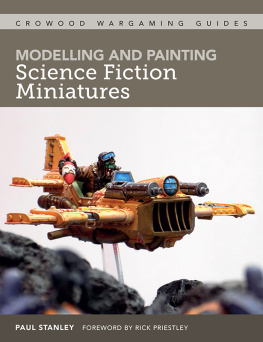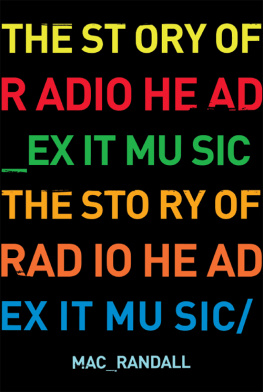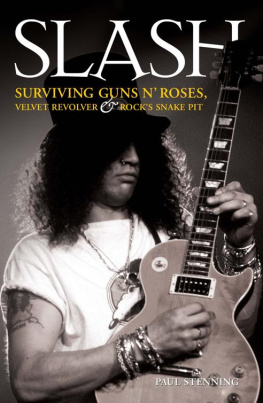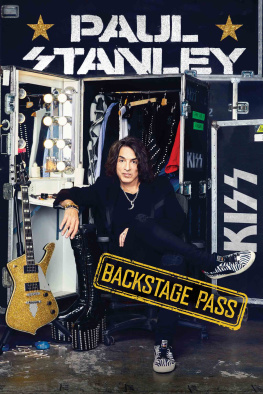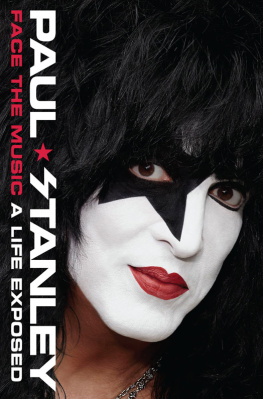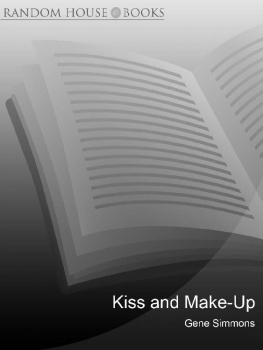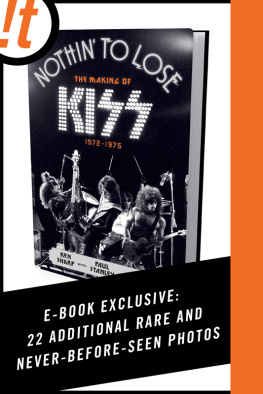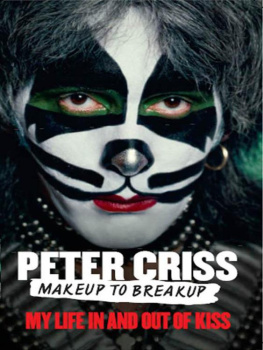
To my family
Contents
Adelaide, Australia, March 3, 2013
I sit down and look in the mirror, staring for a moment into the eyes peering out at me. The mirror is surrounded by high-watt theater-style bulbs, and on the table in front of the brightly lit mirror is a small black makeup case. We hit the stage in about three hours, which means its time for the ritual that has defined my professional life for forty years.
First, I wipe my face with an astringent, to close the pores. Then I grab a container of clown white, a thick, cream-based makeup. I dip my fingers into the tub of white goo and start applying it all over my face, leaving some space open around my right eye, where the rough outline of the star will be.
There was a time when this makeup was a maskhiding the face of a kid whose life up to then had been lonely and miserable. I was born with no right earIm deaf on that side, tooand the most searing early memories I have are of other kids calling me Stanley the one-eared monster. It was often kids I didnt even know. But they knew me: the kid with a stump for an ear. When I was out among people I felt naked. I was painfully aware of being constantly scrutinized. And when I came home, my family was too dysfunctional to provide any kind of support.
Once the white is on, I take the pointed end of a beauticians comb, one with a metal point, and sketch the outline of the star, freehand, around my right eye. It leaves a line through the white makeup. Then with a Q-tip I clean up the inside of the star. I also clean up the shape of my lips.
The character taking shape on my face originally came about as a defense mechanism to cover up who I really was. For many years when I first put this makeup on, I had a sense of another person coming out. The insecure, incomplete kid with all the doubts and all the internal conflicts suddenly got painted away, and that other guy came out, the guy I had created to show everybody that they should have been nicer to me, that they should have been my friend, that I was someone special. I created a guy who would get the girl. People Id known earlier in life were astonished by my success with KISS. And I understand why. They never knew what was going on inside me. They never knew why I was the way I was, what my aspirations were. They never knew any of that. To them I was just a fuck-up or a freak. Or a monster.
Next, I get up and go into another roomtheres usually a bathroom adjoining the dressing rooms. I hold my breath and powder my entire face with white powder. This fixes the white to my face and allows me to sweat through it during the show. At this point I can touch the white and it doesnt come off on my finger. I learned this part of the process by trial and errorearly on I would be blinded by the makeup running into my eyes.
As a young kid I used to dream that when I got older, I would become a masked crime-fighter. I wanted to be the Lone Ranger. I wanted to be Zorro. I wanted to be the guy up on a hill on a horse, with a mask onthat vision I saw in movies and on television. This lonely kid wanted to do that, and this lonely kid ended up doing that. I made my own reality. The character I createdthe Starchildwould go up on stage and be that guy, the superhero, as opposed to the person I really was.
I reveled in being that guy.
But sooner or later, I had to go back down the stairs. I had to come off stage. When you come down those steps you are confronted with the totality of your life. For many years, all I could think when I left the stage was, Now what? Back then, home was a sort of purgatory. During the short periods when KISS was not on the road I would sit on the sofa in my New York City apartment and think, Nobody would believe that Im home and have no fucking place to go. The band was my life-support system, but it was also a way to stave off establishing the types of relationships that constitute a real life. At home, all I felt was a hunger: an important need wasnt being addressed, wasnt being filled by anything else. In one sense, I was always on my ownremote and inaccessible; but in another sense, I couldnt stand to be on my own.
With time, the line between the character and the man blurred. I began to take part of that guy offstage with me. Girls wanted that guy. People just assumed I was that guy. Still, I knew I really wasnt that guy. I could suspend reality onstage, but I couldnt sustain it; getting through a whole day as the Starchild was difficult. Because I didnt believe it. I knew the truth. I knew who I really was.
I was also very defensive. When people around me poked fun at each other, I could dish it out but I couldnt take it. I knew it must be much nicer to be able to laugh at yourself, to laugh about your own quirks and shortcomings, but I still couldnt get myself to that place. I couldnt let goit was an instinctive reaction to having been constantly scrutinized and ridiculed as a child. I was still too insecure, too self-conscious. Though I didnt fully understand it myself (and nobody around me did either, since I never revealed anything about my ear), I was still fueled by the bitterness of my past. I imbued my jokes with undertones of maliciousness at other peoples expense.
Hit me once and Ill hit you twice.
Its easy to live your life with your hand closed. But you get nothing with a fist that you cant get in multitudes with your hand open. Unfortunately, that message was lost on me for a long, long time. And throughout that time, I felt a sense of struggle within, a sense of dissatisfaction, inadequacy, and profound loneliness.
After the white makeup is fixed with powder, I go back into the dressing room, sit down at the mirror again, and brush away any powder inside the shape of the star around my eye. Next, I trace the outline of the star with a black eyebrow pencil. Then I take black grease paint, which is a little waxier than the clown white, and use a brush to paint in the star. I go into the other room again and fix the black makeup with talcum-based baby powder, which is less opaque than the white theatrical powder on the rest of my face. I return to the dressing room and line my left eye and eyebrow with black waterproof eyeliner. As it dries, I look in the mirror.
In earlier periods of my life, I didnt necessarily like the person I saw when I looked in the mirror. But I was tryingtrying to become the person I wanted to be as opposed to remaining complacent. The problem was, no matter what I tried, nothing seemed to get me where I wanted to go. As KISS endured its ups and downs, I realized at various turns that many of the assumptions I held about what would satisfy meor perhaps just make me comfortable with myselfhad been wrong. I thought the fix was being famous. I thought the fix was being rich. I thought the fix was being desirable. By 1976, with the success of the KISS Alive! album, we became famous. But I found that rubbing my fame in peoples faces didnt make me feel any better. By the end of the 1970s, we had made millions of dollars. But I found that the moneyand the clothes, and the cars, and the collectible guitars I bought with itdidnt make me happy either. And as far as being desirable, from the moment of the release of our first album, sex was available any time and all the time. But I found I could be with somebody and still feel alone. I once heard someone say that youre never more alone than when youre sleeping with the wrong person. Thats true. And while there are worse ways to suffer than bedding Penthouse Pets and Playboy Playmates, the happiness of those experiences proved transient. Exhilarating, yes, but momentary. I learned that none of itwhile enjoyablecould take the place of whatever I felt was missing inside of me.
Next page

